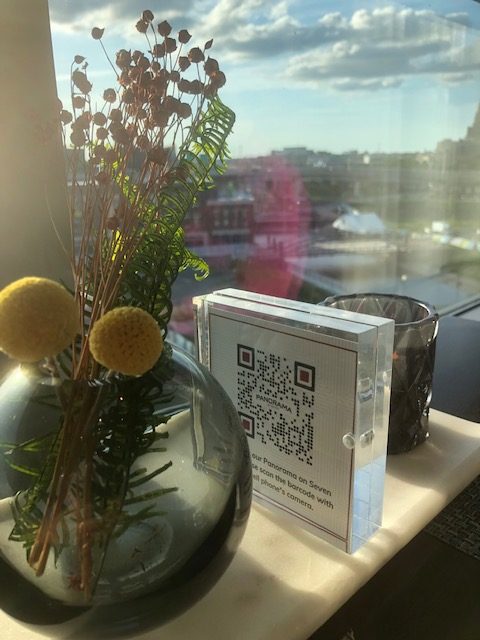Curb appeal. It is a fundamental tenet of residential real estate sales. And the concept applies way beyond the view from the curb to subtle detailed touches like a freshly baked apple pie in the kitchen. It is a recognition that a prospect’s antennae include more than their physical senses. It includes their subconscious reading of features they may not be able to articulate. It is the epitome of architect Mies van der Rohe’s line, “God is in the details.”
The picture is a table at the Panorama on Seven restaurant at the Buffalo, NY Harbor Center Marriott. Their goal was to provide the now-familiar QR code to ensure guests have a touchless menu. Notice how the code is embedded in attractive Lucite and placed on the table between a lovely flower arrangement and a candle. Consider the subtle elevation of its elegance and importance. What might this imply about their food?
I recently took my car to a new upscale car wash near my home. After depositing $10 in the payment machine and selecting the wash I wanted, I pulled into the car wash to allow the brushes and spray machines to do their work. For four minutes I sat in the car looking at a blank wall on my left. It would have been a great opportunity to entertain, educate or inspire me. As I pulled out, the giant blowers came on to blow-dry my car. Where were the pinwheels? Where were the little teddy bears displayed to allay the potential fears a younger passenger? No detail enriched my time. While my car got clean, my experience was boring.
Details are more than small features in a customer’s experience. Done well, they tell a story. The goldfish tank in the dentist’s office is a sign of life. The free samples in a grocery store do more than merchandise a new offering; they communicate generosity. The antique puzzles on the guest tables of a Cracker Barrel restaurant not only reduce the perception of wait time, they telegraph a sense of old-fashioned nostalgia that is a part of the restaurant chain’s brand. Four hundred thread count sheets at a Ritz-Carlton hotel are not just a tool for comfort; they are a quiet symbol of luxury.
Pay attention to the details of your customers’ experiences. Consider their physical features while amplifying their symbolic communications. Done well curb appeal can compel your customers to return and sing your praises even if their rational mind cannot tell you exactly why.
